A certified electrician is a professional who has completed the necessary training, education, and examinations to earn certification in the field of electrical work. Certification is often required to demonstrate competence and ensure the safety of electrical installations.
Here are some key points about certified electricians:
Education and Training: Certified electricians typically undergo formal education and training programs in electrical systems and safety. This education may include classroom instruction, hands-on training, and apprenticeships.
Licensing: In many regions, electricians are required to be licensed or certified by a state or local authority. Licensing ensures that electricians have met specific requirements and have demonstrated their knowledge and skills in electrical work.
National Electrical Code (NEC): Certified electricians are well-versed in the National Electrical Code, which is a set of safety standards and regulations that govern electrical installations in the United States. Knowledge of the NEC is crucial for ensuring electrical systems are installed safely and in compliance with the law.
Safety: Safety is paramount for certified electricians. They are trained to work with high voltage, and they understand the potential risks associated with electrical work. They follow safety protocols to protect themselves and others.
Specializations: Certified electricians may have specializations in specific areas, such as residential, commercial, or industrial electrical work. Some may focus on particular tasks, such as installing and maintaining electrical systems, wiring, or lighting.
Troubleshooting: Electricians are skilled at diagnosing electrical problems and performing repairs. They use tools and equipment to identify issues and implement solutions to ensure that electrical systems function correctly.
Installation: Certified electricians are responsible for installing, connecting, and maintaining electrical systems, including wiring, circuits, outlets, lighting fixtures, and electrical panels.
Upgrades: They are often involved in upgrading electrical systems to meet modern requirements and safety standards. This may involve replacing old wiring, circuit breakers, or electrical panels.
Code Compliance: Certified electricians are knowledgeable about local and national electrical codes and ensure that electrical installations comply with these regulations. This helps maintain safety and ensures that electrical work passes inspections.
Continuing Education: Many certified electricians are required to participate in continuing education and training to stay up to date with the latest technologies and safety standards in the electrical industry.
Emergency Repairs: In the event of electrical emergencies, certified electricians can quickly respond to address issues and restore electrical services.
Certification Bodies: Different regions and countries may have their own certification bodies and requirements for electricians. In the United States, for example, the National Electrical Contractors Association (NECA) and the International Brotherhood of Electrical Workers (IBEW) are among the organizations that offer apprenticeship programs and certification.
Final Words
Hiring a Certified Electrician Near Union City ensures that your electrical work is done safely and in compliance with regulations, reducing the risk of electrical hazards and ensuring that your electrical systems function correctly.



